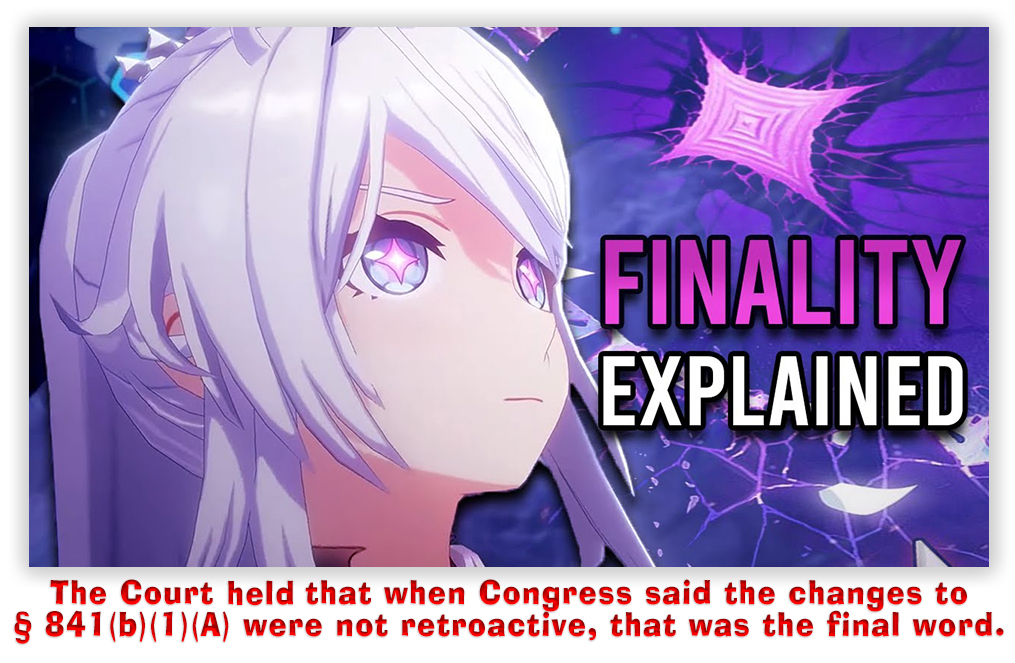We post news and comment on federal criminal justice issues, focused primarily on trial and post-conviction matters, legislative initiatives, and sentencing issues.

6TH CIRCUIT STRAINS TO INVALIDATE COMPASSIONATE RELEASE CHANGE-IN-THE-LAW CATEGORY
 A three-judge 6th Circuit panel took a wrecking ball to the Sentencing Commission’s compassionate release statute last week, joining the 3rd and 7th Circuits in invalidating the “extraordinary and compelling” reason that the defendant was serving years and years more than Congress now believes he deserves.
A three-judge 6th Circuit panel took a wrecking ball to the Sentencing Commission’s compassionate release statute last week, joining the 3rd and 7th Circuits in invalidating the “extraordinary and compelling” reason that the defendant was serving years and years more than Congress now believes he deserves.
The compassionate release statute, 18 USC § 3582(c)(1)(A), allows a court to reduce a prison sentence for “extraordinary and compelling reasons.” Congress authorized the Sentencing Commission to define what constitutes an extraordinary and compelling reason, and the USSC did so in the revised USSG § 1B1.13 adopted in November 2023. The reasons included medical reasons, family circumstances, and prisoner abuse.
The “extraordinary and compelling reason” at issue in last week’s case is set out in USSG § 1B1.13(b)(6). It holds that a nonretroactive change in the law can present a reason warranting a sentence reduction if a prisoner has served at least 10 years of “an unusually long sentence,” and there is a “gross disparity” between the inmate’s sentence and the sentence that would apply if nonretroactive changes in the law since the original sentencing were given retroactive effect. Even then, it’s not automatic. Instead, § 1B1.13(b)(6) directs the court to fully consider “the defendant’s individualized circumstances.”
 The best example of such a sentence is where someone has been convicted of multiple 18 USC § 924(c) sentences for using a gun in drug crimes or crimes of violence. Congress intended that if Donnie Drugseller had been convicted of a § 924(c) and served his mandatory five years, only to get out and do the same thing again, the second § 924(c) would carry a minimum of 25 years. This makes perfect sense: we should learn from our experiences, and that includes Donnie learning that he shouldn’t carry a gun.
The best example of such a sentence is where someone has been convicted of multiple 18 USC § 924(c) sentences for using a gun in drug crimes or crimes of violence. Congress intended that if Donnie Drugseller had been convicted of a § 924(c) and served his mandatory five years, only to get out and do the same thing again, the second § 924(c) would carry a minimum of 25 years. This makes perfect sense: we should learn from our experiences, and that includes Donnie learning that he shouldn’t carry a gun.
Poor drafting, however, resulted in a statute requiring that Donnie, who carried a gun while selling drugs on Monday and did it again on Tuesday, receive two “stacked” § 924(c) counts–one for each day–and be sentenced for 30 years mandatory and consecutive years. That would be five years for Monday’s gun and 25 more years for Tuesday’s.
Congress did not ever intend that, fixing its mistake in a revised § 924(c) included in the First Step Act. Now the statute does what it was always meant to do, applies the 25-year sentence only if Donnie had been convicted of a § 924(c) crime prior to committing the second one. Under the changed law, Donnie’s sentence would have been 10 years (five for Monday and five more for Tuesday).
However, for political reasons, the § 924(c) change was not made retroactive to reach sentences imposed before the First Step Act was passed. In last week’s Bricker decision, the 6th Circuit conceded that this left people like Donnie, who were sentenced before First Step,
serving prison sentences that are much longer than the sentences of new inmates who committed the exact same crimes. Recognizing the unfairness, the Commission decided that the disparity was… a factor worth considering when deciding whether an individual old-timer had an “extraordinary and compelling reason” for early release. That is understandable and even laudable. The question is whether the Commission has the authority to do that under the law, particularly the Constitution.
Back before the 2023 adoption of the new § 1B1.13, the 6th Circuit held in United States v. McCall that “the that the phrase ‘extraordinary and compelling’ in § 3582(c)(1)(A)(i) is clear and unambiguous” and that nonretroactive legal changes in the law could not be considered extraordinary and compelling reasons for a sentence reduction:
The Circuit panel held that under the Constitution’s separation of powers, the Commission lacked the “power to overrule a Circuit Court’s interpretation of a statute” or to adopt a policy statement that contradicts a federal statute: “[T]he Commission cannot overrule McCall‘s determination about the plain text of the statute by promulgating a contradictory policy statement… we conclude that the Commission overstepped its authority and issued a policy statement that is plainly unreasonable under the statute and in conflict with the separation of powers. We therefore hold that USSG § 1B1.13(b)(6) is invalid.
In her dissent, Judge Stranch vigorously disagreed, arguing that “the majority opinion misapprehends recent Supreme Court precedent on administrative law, misconstrues this court’s opinion in… McCall, and ignores the plain language of several statutes to read constraints into a statutory scheme where none exist.”
 Writing in his Sentencing Law and Policy blog, Ohio State University law professor Doug Berman blasted the Bricker decision as “another reminder that courts can and often will ignore textualism principles when it leads to a policy outcome that they dislike.” He notes that “the panel majority in Bricker [is] inventing much broader non-textual limits on compassionate release than did the Third Circuit in United States v. Rutherford… That ruling is the subject of a pending cert petition, and Bricker surely increases the odds that cert on this issue will be eventually granted. But… I am quite unsure whether congressional text or judicial policy preferences would ultimately prevail on this matter at SCOTUS.”
Writing in his Sentencing Law and Policy blog, Ohio State University law professor Doug Berman blasted the Bricker decision as “another reminder that courts can and often will ignore textualism principles when it leads to a policy outcome that they dislike.” He notes that “the panel majority in Bricker [is] inventing much broader non-textual limits on compassionate release than did the Third Circuit in United States v. Rutherford… That ruling is the subject of a pending cert petition, and Bricker surely increases the odds that cert on this issue will be eventually granted. But… I am quite unsure whether congressional text or judicial policy preferences would ultimately prevail on this matter at SCOTUS.”
United States v. Bricker, Case No. 24-3286, 2025 U.S.App. LEXIS 9538 (6th Cir. April 22, 2025)
United States v. McCall, 56 F.4th 1048 (6th Cir. 2022)
Sentencing Law and Policy, Deepening circuit splits, divided Sixth Circuit panel decides to “look beyond” statutory text to rewrite compassionate release limits (April 24, 2025)
United States v. Rutherford, 120 F.4th 360 (3d Cir. 2024)
– Thomas L. Root














